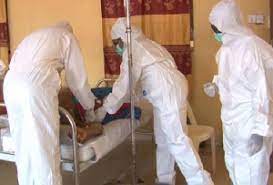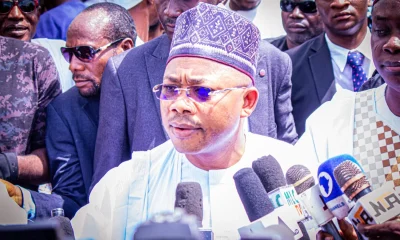Health
NCDC Activates Emergency Operations Centre for Monkeypox

Dr Ifedayo Adetifa, Director General (DG), Nigeria Centre for Disease Control and Prevention (NCDC), says a national multisectoral Emergency Operations Centre (EOC) for Monkeypox has been activated in the country.
Adetifa, who disclosed this to the News Agency of Nigeria (NAN) on Friday in Abuja, said the move followed a risk assessment conducted by the NCDC on Monkeypox outbreaks in multiple countries.
The DG said EOC would continue to coordinate ongoing response activities in the country while contributing to the global response.
NAN reports that the United Arab Emirates (UAE) became the first Gulf state to record a case of monkeypox following the outbreak of cases in the UK and US.
The US monkeypox case tally is relatively small compared to some countries in Europe. Spain has confirmed 84 cases and the UK 85. In total, nearly 300 cases have been confirmed outside Africa since the start of the month.
The Czech Republic and Slovenia also reported their first cases on May 24, joining 18 other countries to detect the virus outside its usual African base.
Confirmed cases of the disease have been reported in Europe, Australia and America.
That number is expected to rise further, but public health experts say the overall risk to the general population remains low. The symptoms often include fever and rash – but the infection is usually mild.
However, Adetifa said that a national multisectoral multidisciplinary Incident Management System for Monkeypox had been activated at level two (medium).
“You are aware that Level 1: is watching mode. Level 2: is alert mode while Level 3: is emergency response mode, so Nigeria is on level two at the moment,” he explained.
The NCDC DG said that the EOC would continue to monitor and coordinate efforts to reduce the risk of spread within and outside the country while contributing to ensuring global outbreak preparedness and control.
According to him, Monkeypox occurs sporadically, primarily in Central and West Africa, however, some of the cases which had been reported in other parts of the world had no travel link to these regions.
“It does not spread easily between people, but it can be spread through: touching clothing, bedding or towels used by someone with the monkeypox rash, touching monkeypox skin blisters or defects.
“If you get infected with monkeypox, it usually takes between five and 21 days for the first symptoms to appear. Symptoms include fever, headache, muscle aches, backache, swollen lymph nodes, chills and exhaustion.
“A rash can develop, often beginning on the face, then spreading to other parts of the body. The rash changes and goes through different stages before finally forming a scab, which later falls off,” he explained.
He emphasised that anyone could be infected with or pass on monkeypox “therefore, we must discourage stigmatisation.
“If you are showing known symptoms of the disease, promptly contact the NCDC toll-free line 6232 for guidance on the steps to take,” he said.
NAN recalls that the World Health Organization (WHO) says the virus can be contained with the right response in countries outside Africa where it is not usually detected.
“We encourage you all to increase the surveillance of monkeypox to see where transmission levels are and understand where it is going,” the WHO’s Director for Global Infectious Hazard Preparedness, Sylvie Briand, said at a conference on Tuesday.
Meanwhile, Germany said it had ordered up to 40,000 doses of the Imvanex vaccine, effective against monkeypox.
Anyone already vaccinated with a smallpox vaccine years ago as part of a global bid to eradicate the disease should have existing immunity, German health officials said.
But they added that the older treatment had more side effects so is not suitable for fighting monkeypox today.
In France where three cases have been detected, officials announced a targeted vaccination campaign for adults who had been recently exposed.
Authorities there are recommending that a vaccine be given within four days of exposure, but up to 14 days afterwards if necessary.
In England, officials announced, as of May 24, 14 more cases of the virus had been detected – bringing the total number of cases in the UK to 71. (NAN)
Health
Lassa Fever: NCDC Registers 1 Death, 15 New Cases in 1 Week

The Nigeria Centre for Disease Control and Prevention (NCDC) has reported one death and confirmed 15 new cases of lassa fever within one week across the country.
The NCDC said this in a situation report for week 13 published on its website on Friday.
Reports says that lassa fever is an acute viral hemorrhagic illness transmitted to humans through contact with food or household items contaminated by infected rodents or contaminated persons.
Its symptoms include fever, headache, sore throat, general body weakness, cough, nausea, vomiting, diarrhoea, muscle pains, chest pain, and, in severe cases, unexplainable bleeding from ears, eyes, nose, mouth and other body openings.
The NCDC noted a decrease in the number of confirmed cases from 25 cases in week 12 to 15 cases in the reporting week, although the number of suspected cases increased compared to the same period in 2023.
Cumulatively, from week one to 13, the country recorded 806 confirmed cases and 150 deaths, with a case fatality rate (CFR) of 18.6 per cent, higher than the CFR for the same period in 2023 (17.5 per cent).
“Twenty-five states have recorded at least one confirmed case across 125 local government areas in 2024.
“Sixty-two per cent of all confirmed cases were recorded from Ondo, Edo, and Bauchi, with Ondo State accounting for 24 per cent, Edo 22 per cent, and Bauchi 16 per cent,” it said.
According to the report, no health worker was infected in the reporting week, and individuals between the ages of 31 and 40 were predominantly affected by the infection.
The NCDC said the National Lassa Fever Multi-partner, Multi-sectoral Incident Management System had been activated to coordinate response at all levels at the Emergency Operations Centre (EOC).
The NCDC highlighted some challenges in the fight against lassa fever, including the late presentation of cases leading to increased CFR and poor health-seeking behaviour.
It attributed the latter to the high cost of treatment and clinical management of lassa fever, as well as poor environmental sanitation and awareness in high-burden communities. (NAN)
Health
Nigeria First to Introduce New 5-in-1 Vaccine Against Meningitis – WHO

Nigeria has become the first country in the world to roll out a new vaccine – Men5CV – recommended by World Health Organisation(WHO), to protect people against meningitis.
The world health body, in a statement on Friday, said that the vaccine would protect people against five strains of meningococcus bacteria, and described Nigeria’s feat as historic.
It said that health workers would begin an immunisation campaign aimed at reaching one million people.
The statement said that the vaccine and emergency vaccination activities are funded by Gavi, the Vaccine Alliance, which funds the global meningitis vaccine stockpile and supports lower-income countries with routine vaccination against meningitis.
According to the WHO, Nigeria is one of the 26 meningitis hyper-endemic countries of Africa, situated in the area known as the African Meningitis Belt.
It noted that in 2023, there was a 50 per cent jump in annual meningitis cases reported across Africa.
“In Nigeria, an outbreak of Neisseria meningitidis (meningococcus) serogroup C outbreak, led to 1,742 suspected meningitis cases, including 101 confirmed cases and 153 deaths in seven of 36 Nigerian state, between October 2023 and March 2024.
The states are Adamawa, Bauchi, Gombe, Jigawa, Katsina, Yobe, Zamfara.
“To quell the deadly outbreak, a vaccination campaign was undertaken on 25–28 March 2024 to initially reach more than one million people aged 1-29 years,” it said.
The statement noted that meningitis was a serious infection that leads to the inflammation of the membranes (meninges), that surround and protect the brain and spinal cord.
“There are multiple causes of meningitis, including viral, bacterial, fungal and parasitic pathogens.
“Symptoms often include headache, fever and stiff neck. Bacterial meningitis is the most serious, and can also result in septicaemia (blood poisoning). It can seriously disable or kill within 24 hours,” the statement added.
It quoted Dr Tedros Ghebreyesus, WHO Director-General, as saying that meningitis was an old and deadly foe, adding that the new vaccine holds the potential to change the trajectory of the disease, preventing future outbreaks and saving many lives
“Nigeria’s rollout brings us one step closer to our goal of eliminating meningitis by 2030,” Ghebreyesus said.
He said that the revolutionary new vaccine offers a powerful shield against the five major strains of the meningococcal bacteria – A, C, W, Y and X – in a single shot.
All five strains cause meningitis and blood poisoning.
According to him, this provides broader protection than the current vaccine used in much of Africa, which is only effective against the A strain.
He said that the new vaccine has the potential to significantly reduce meningitis cases and advance progress in defeating meningitis.
“This is especially important for countries like Nigeria where multiple serogroups are prevalent.
“The new vaccine uses the same technology as the meningitis A conjugate vaccine (MenAfriVac®), which wiped out meningococcal A epidemics in Nigeria,” the WHO boss said.
The statement quoted Prof. Muhammad Pate, Nigeria’s Minister of Health and Social Welfare, as saying that Northern Nigeria, particularly the states of Jigawa, Bauchi and Yobe, were badly hit by the deadly outbreak of meningitis.
“This vaccine provides health workers with a new tool to both stop this outbreak and also put the country on a path to elimination,” Pate said.
According to him, Nigeria has done a lot of work preparing health workers and the health system for the rollout of the new vaccine.
“We got an invaluable support from our populations in spite of the fasting period, and from our community leaders, especially the Emir of Gumel in Jigawa, who personally launched the vaccination campaign in the state.
“We’ll be monitoring progress closely and hopefully expand the immunisation in the coming months and years to accelerate progress,” he said.
The minister said that the new multivalent conjugate vaccine took 13 years of efforts and was based on a partnership between PATH and the Serum Institute of India.
“Financing from the UK government’s Foreign, Commonwealth and Development Office was critical to its development,” he said.
Pate said that in July 2023, WHO prequalified the new Men5CV vaccine (which has brand name MenFive®), and in October 2023 issued an official recommendation to countries to introduce the new vaccine.
According to him, Gavi allocated resources for the Men5CV rollout in December 2023, which is currently available for outbreak response through the emergency stockpile managed by the International Coordinating Group (ICG), on Vaccine Provision.
He added that the roll-out, through mass preventive campaigns, was expected to start in 2025 across countries of the Meningitis Belt.
Mr Andrew Mitchell, UK Minister for Development and Africa, was also quoted as saying that the rollout of one million vaccines in northern Nigeria would help save lives, prevent long-term illness and boost the goal of defeating meningitis globally by 2030.
“This is exactly the kind of scientific innovation, supported by the UK, which I hope is replicated in years to come, to help us drive further breakthroughs, including wiping out other diseases,” Mitchell said.
He said that WHO has been supporting the Nigeria Centre for Disease Control and Prevention (NCDC), in responding to the meningitis outbreak in the country.
According to him, the areas of support include disease surveillance, active case finding, sample testing and case management.
“WHO and partners have also played a vital role in supporting Nigeria to prepare for the rollout of the new vaccine and training health workers,” he said.
Dr Nanthalile Mugala, PATH’s Chief of Africa Region, was also quoted as saying that meningococcal meningitis had tormented countries across Africa, year after year.
“The introduction of MenFive® in Nigeria heralds a transformative era in the fight against meningococcal meningitis in Africa.
“Building on the legacy of previous vaccination efforts, this milestone reflects over a decade of unwavering, innovative partnerships.
“The promise of MenFive® lies not just in its immediate impact but in the countless lives it stands to protect in the years to come, moving us closer to a future free from the threat of this disease,” Mugala said.
According to her, in 2019, WHO and partners launched the global roadmap to defeating meningitis by 2030.
“The roadmap sets a comprehensive vision towards a world free of meningitis, and has three goals including the elimination of bacterial meningitis epidemics.
Another goal is the reduction of cases of vaccine-preventable bacterial meningitis by 50 per cent and deaths by 70 per cent, as well as the reduction of disability and improvement of quality of life after meningitis, due to any cause.
Ms Aurélia Nguyen, Chief Programme Officer at Gavi, the Vaccine Alliance, was also quoted as saying that with outbreaks of infectious diseases on the rise worldwide, new innovations such as MenFive® were critical in helping the fight back.
She said that Vaccine Alliance funds the global stockpile as well as vaccine rollout in lower-income countries.
“This first shipment signals the start of Gavi support for a multivalent meningococcal conjugate vaccine (MMCV) programme which, with the required donor funding for our next five years of work, will see pentavalent meningococcal conjugate vaccines rolled out in high-risk countries.
“Thanks to vaccines, we have eliminated large and disruptive outbreaks of meningitis A in Africa, now we have a tool to respond to other serogroups that still cause large outbreaks resulting in long-term disability and deaths,” Nguyen said.
According to her, following Nigeria’s meningitis vaccine campaign, a major milestone on the road to defeat meningitis is the international summit on meningitis taking place in Paris in April 2024, where leaders will celebrate progress, identify challenges and assess next steps.
“It is also an opportunity for country leaders and key partners to commit, politically and financially, to accelerate progress towards eliminating meningitis as a public health problem by 2030,” she said.(NAN)
Health
World Health Day: FG Reiterates its Commitment to Strengthening PHC

By Laide Akinboade, Abuja
Coordinating Minister of Health and Social Welfare, Prof Muhammad Ali Pate, has reiterated the commitment of the Federal government, through the Basic Health Care Provision Fund, (BHCPF), I strengthening primary healthcare delivery system.As Nigeria joins the rest of the world to celebrate the 2024 World Health Day,Professor Pate, who stated this in a speech to commemorate the 2024 World Health Day, also noted that through the BHCPF and the Nigeria Health Sector Renewal and Investment Initiative and strategic partnerships, the government is also reaching remote and underserved communities, providing essential healthcare services and promoting health education.
He added that the FG is also committed to improving infrastructure to ensure the availability of essential drugs and commodities in health facilities across the country.In a statement signed by the Director of information in the ministry, Patricia Deworitshe, the minister maintained that the Primary healthcare remains the centre of the federal government focus, adding that the administration is determined more than ever before to ensure the delivery of quality, efficient and affordable health care through the Primary Health Care facilities.He stated that while the government continues to invest in improving healthcare infrastructure and services, the responsibility for health ultimately rests with each individual.Professor Pate said Nigerians must take proactive steps to safeguard our health and well-being by adopting healthy lifestyles, prioritizing preventive healthcare measures, and seeking timely medical attention when necessary, adding that it is only through collective action and mutual support that we can achieve the vision of a healthier Nigeria for all.He also reaffirms the ministry’s unwavering commitment to advancing the health and well-being of all Nigerians, noting that the right to health is not just a lofty ideal, but a fundamental human right enshrined in the Universal Declaration of Human Rights.The minister, however, recognizes that there is still much work to be done, noting that challenges such as inadequate infrastructure, healthcare worker shortages, and persistent health disparities continue to impact the health and well-being of our citizens.He reiterated that the Federal Ministry of Health and Social Welfare remains committed to strengthening our healthcare systems, improving health outcomes, and ensuring that no one is left behind.Pate noted that the theme for this year’s celebration, which is, “My Health, My Right,” underscores the fundamental principle that every individual has the right to attain the highest standard of physical and mental health without discrimination or barriers.


























